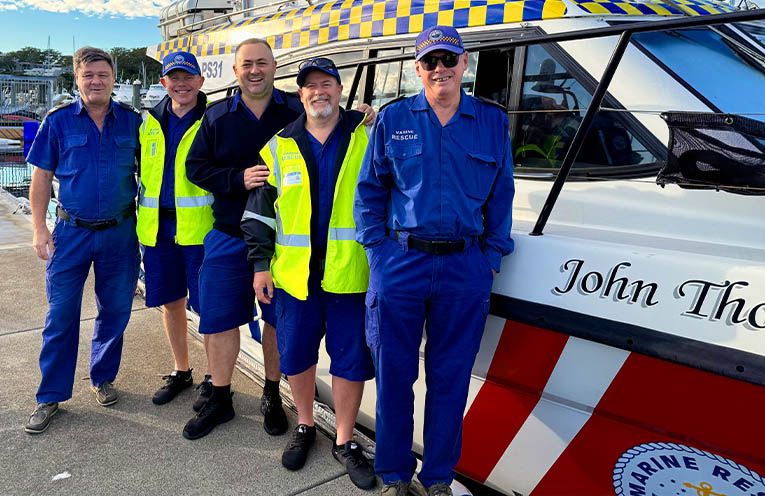IT’S been ten weeks since the crew of John Thompson – Marine Rescue Port Stephens’ offshore vessel – steered into the blackness of open ocean for what became one of the unit’s most challenging rescues in recent memory.
But for those on board that night, the moments are still vivid.
“It was one of those calls that comes just as you sit down to dinner,” recalls volunteer crew member Matt Coleborne.
“We left our families, still hungry, and launched into the unknown.”
On Saturday, March 29, around sunset, the five-person crew was tasked to assist Hustle, a 10-metre flybridge cruiser that had run out of fuel roughly 30 kilometres off the coast.
With a new moon above and 2.5-metre swell below, the conditions were unforgiving.
“There was no light. No horizon. Just the stars, the wind, and the motion,” Coleborne said.
“You lose all depth perception. It’s surreal.”
The team – Robert Johnson, Howard Faulks, Mark Page, Andy Wilson, and Coleborne – located Hustle after 8pm and attempted a textbook tow-line throw from the deck of John Thompson.
But in the confusion of swell and darkness, the first approach missed.
The second attempt landed perfectly – only to be ripped off course by wind.
In a bold move, the crew reversed John Thompson into position, only to be met by a wave that surged over the rear deck, momentarily lifting the crew off their feet.
“I thought I was going to be washed flat across the deck,” said Coleborne.
“Then I felt a grip on my harness – Robert had me.
“One hand on the rail, the other on my tether. Calm as anything.”
Once the tow was secured, the journey home wasn’t without drama.
Around 10pm, the tow bridle snapped under pressure.
Within 14 minutes, the crew re-rigged the line in complete darkness, relying on instinct, communication, and months of training.
The final challenge came outside the marina at Nelson Bay, where a 3-4 knot current made rafting the two vessels together feel “like threading a needle in a wind tunnel”.
But inch by inch, they brought Hustle alongside and safely onto the fuel dock at D’Albora Marina just after midnight.
“It was a long, physical, mentally demanding night,” said Coleborne, who completed his crew rating shortly after the mission.
“But it felt like the culmination of all the training and teamwork we’d been building for months.”
Reflecting on the experience weeks later, the crew agrees: the conditions were tough, but it was the quiet moments of calm leadership, instinctive teamwork, and unwavering support that stood out most.
“We’re volunteers,” Wilson said.
“No one’s getting paid to be out there at midnight, in the dark, getting knocked around by waves.
“But we do it – for the community, for each other, and because when someone’s in trouble out there, we want to be the ones who show up.”




